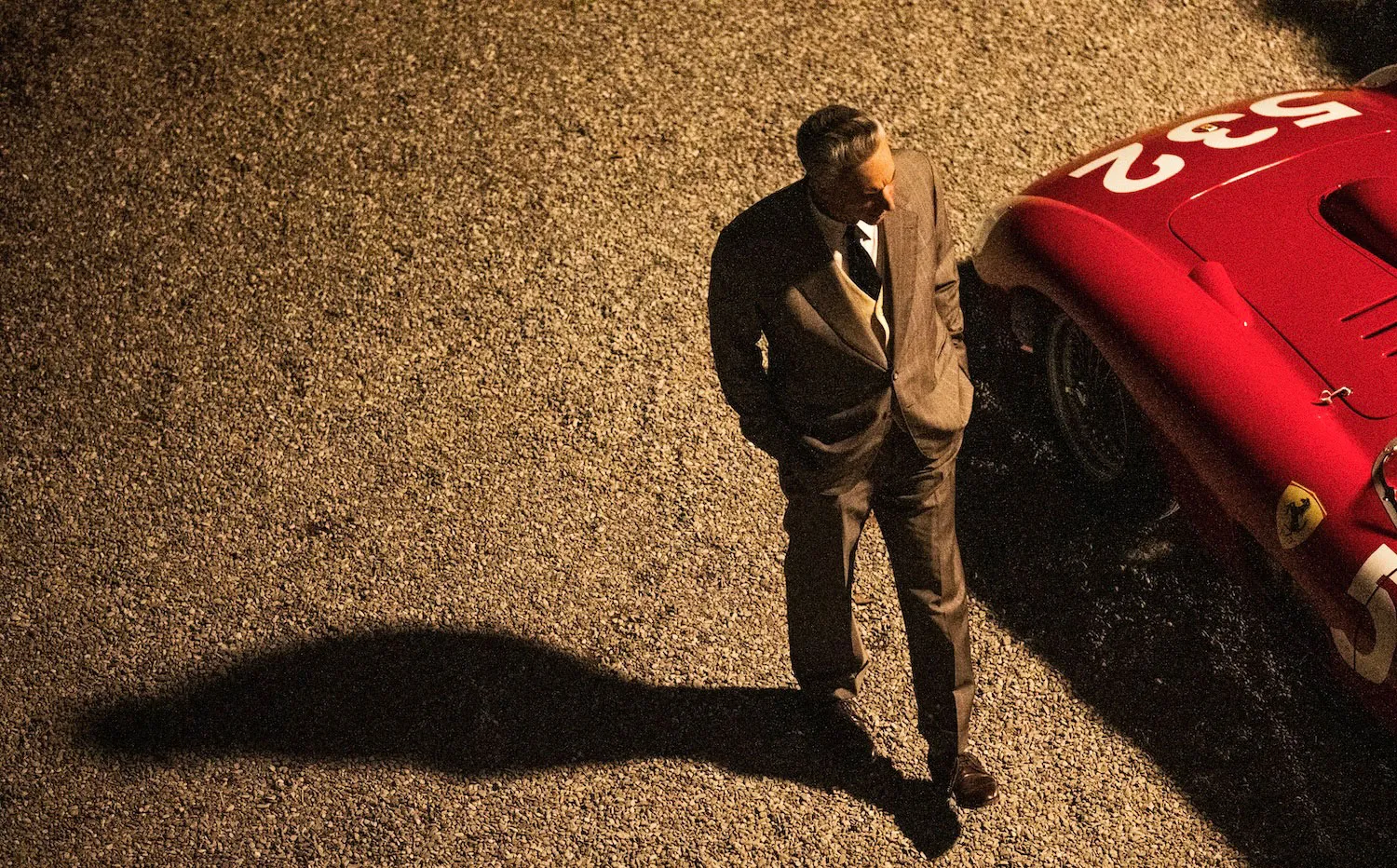Ferrari Review
Baffling creative decisions, some truly poor CGI, and an array of deeply flawed Italian accents characterize what should have been a film about the man who invented Ferrari.
Ferrari explores a summer in the life of Enzo Ferrari (Adam Driver) - the racing car driver turned entrepreneur. He’s preparing his team for the Mille Miglia, a thousand mile race around Italy, and the fate of his financially struggling car empire hangs in the balance. At the same time, his wife discovers his mistress and secret son, and they must work through the grief of losing their own boy to determine how best to proceed.
Directed by Michael Mann, Ferrari is a truly baffling film.
There are so many questions on offer around this movie. Key amongst these is the decision to tackle one single summer in Ferrari’s life. We’ve just come off the back of a sweeping biopic about Napoleon Bonaparte, a man whose achievements and follies - let’s be honest - far outstrip Enzo Ferraris, so it’s not like they couldn’t have chronicled his whole life in a single biopic. Why choose just one summer? Why this summer?
It feels like Mann and screenwriters Troy Kennedy Martin and Brock Yates missed a trick here, because they have actively steered away from everything that makes Enzo Ferrari an interesting figure, and instead hyper-focused on two things; his propensity for controversy particularly when it comes to financials and safety, and his philandering ways.
In real life, the story of Enzo Ferrari seems made for a compelling film. We jump in with the brand already established, but Enzo’s journey from racecar driver to actually funding a working car factory and having it be such a powerhouse was never a straight line, and his challenges at getting it financed and his decision to ultimately base it in Modena - a small Northern Italian town that is now renowned for the presence of the brand - was a bold and brave one. Any of that would have made for a fantastic film, and while it is ever so slightly alluded to, instead this movie chooses to focus on Enzo deciding whether to give his illegitimate son his last name and trying to save Ferrari from financial bankruptcy.
It’s almost comical to write that last line, because the financial bankruptcy point is probably the worst part of this film. Part of that is because the effort that Enzo puts into saving his company’s financial fate is so lacklustre, and the solution so nonsense, that it never feels like a real issue. Part of that is because it is revealed midway through the film that their rival, Maserati, is also facing the exact same financial issues (completely undercutting the point the movie is trying to make about Enzo being frivolous with money). And partly, this is also because we have no reference point for their financials. An early scene has one of his staff ask him how many cars Enzo thought they sold last year. “125”, he guesses. “110?” “No, 98”, his staff member replies. “198?” Enzo checks. “No, 98. Nine, eight,” the staff member clarifies. As an audience member, all you can think is WHAT IS THIS! We have no idea how many cars they have to make to be in a good spot. Clearly, Enzo thinks it is 125 or 110, but 98 - something seemingly so shocking to this accountant - isn’t that far off. It just makes no sense.
On the philandering side, which is perhaps the most delved into part of this film outside of the final race (no, scratch that, including the final race), the movie takes a perverse pleasure in pitting Enzo’s wife against his mistress. It’s a needless and mindless exploration of that relationship, with any discussion between Enzo and his mistress only ever tackling on the very surface level the intricacies of their relationship, and any discussion between Enzo and his wife full of tension only imbued by the performers, and not there on the page.
And to that end, we have the performances to consider. Adam Driver is just fine as Enzo Ferrari. He certainly looks cool, strutting around with his hair slicked back, throwing the glasses on. And the accent is perfectly fine - not great, but fine. Some moments of drama, particularly when he is crying over his dead son in the cemetery, don’t seem to land, but the movie never really gives him space to bring emotionality, insisting instead on him generally fast walking through crowds, glad handing officials, prognosticating in black and white TV footage against the media, and then conversely standing very still when tragedy occurs.
Across the board, the other performances are roundly terrible. Gabriel Leone is nothing but annoying and detestable as Alfonso De Portago, Patrick Dempsey barely registers outside of his fantastic white hair, and Shailene Woodley gives a truly bland performance as Lina Lardi, Enzo’s mistress, with an accent that is so poor it is distracting throughout. On top of that, Driver and Woodley possess absolutely zero chemistry and their romance is completely unbelievable.
Then there is Penelope Cruz as Enzo’s wife, Laura. Cruz is the one bright spark in this entire film, and she is a complete powerhouse. Her accent work is good, she does a tremendous amount with very little in the way of good dialogue, and her furious arguments with Driver (there is a little chemistry here, but certainly nothing to write home about) are compelling. Cruz chews this up and spits it out, the burning pain and heartache in her eyes every moment, but the iron will of someone who will do anything to see this thing they’ve built together succeed there at every step. It’s a movie about cars, and of course it is always a little annoying when the film digresses from that in such a significant way, but Cruz’s performance almost makes up for the fact that the film tackles this subject matter. When we cut back to the cars from the Woodley/Driver sequences, we breathe a sigh of relief. When we cut back to the cars from a Cruz scene, it’s with a twinge of regret.
All that being said, there are a couple of cool things. If you weren’t aware of the crash that ends the film (the trailer shows this off, but the historical elements of it are what I am referring to here), you may be as shocked as I was at the ending of this film (and not just because the CGI is so bad for it). And there is a very cool scene at the start of the film with the whole Ferrari team in church, checking their stopwatches. But ultimately, two good scenes can’t make a whole film, and Ferrari crashes by the end because it is - frankly - made of the wrong parts. If you’re interested in seeing a movie about Enzo Ferrari, exploring his immensely interesting life, filled with great performances and accents that sound Italian, and showcasing great car sequences - this is not the film for you.


